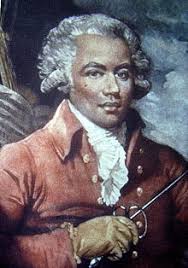|
Joseph Boulogne, Chevalier de Saint George was born in Basse-Terre, Guadeloupe on Christmas day 1745. His father, George de Bologne, was a prostestant planter, married with one daughter Elizabeth, and his mother was his father’s Senegalese slave, Nanon. According to the Black Code of 1685, had Boulogne not already been married, he would have been obliged to marry Nanon. Joseph was a ‘mulatto’, or a man of colour of the first degree. In 1759, the whole family, legitimate and unlegitimate, moved to Paris. Joseph received a first class education and distinguished himself in fencing and music. He made use of both skills during his lifetime, as a musician first, and as a soldier during the revolution. His musical career was both brilliant and thwarted. As a successful composer and a protege of Marie Antoinette, he was offered in 1775 the directorship of the Academie Royale, the Paris Opera. But two of its leading sopranos reportedly complain that they would not work under the leadership of a black man, so he was not appointed. The gossip columnist of the Correspondance wrote the following: No sooner were Mesdemoiselles Arnould, Guimard, Rosalie, and others informed about the news [that Saint-Georges had been proposed as music director of the Opéra], they presented a petition to the Queen, assuring her Majesty that “their honor and their delicate conscience could never allow them to submit to the orders of a mulatto.” Such an important consideration makes all the impression it is expected to make, but, after many projects and discussions regarding the matter, the question has been decided by the king, who in the end took it upon himself to have the Opéra managed on his behalf by the Intendants and Treasurers of the Menus Plaisirs `You can listen to Boulogne's music here: As his father had been raised to the aristocracy (taking the name Saint George) shortly before the family traveled to Paris, Joseph was welcome in high society. He was a close friend of Madame de Montesson and manager to her private theatre. There he met Olympe de Gouges, with whom he became friend. Perhaps the two collaborated in the Club des Amis des Noirs, of which they are sometimes said to have been founding members. Saint-George travelled to England in the late 1780s, and an attempt was made on his life there, perhaps because of his involvement with abolitionist movements. During the revolution he was made first captain of the national guard in Lille, then Colonel of the Black Legion, where he commanded black soldiers, amongst whom Alexander Dumas (père)’ father. His connections with the Duke d’Orleans and Dumouriez caused him to be suspende and emprisoned for 18 months, after which he traveled to Haiti to take part in the revolution there. He came back to Paris at the end of the 18thcentury and died in 1799 of bladder disease.
0 Comments
Leave a Reply. |
About
This is where I live blog about my new book project, an intellectual biography of three French Revolutionary women philosophers. Categories
All
Archives
November 2022
|

 RSS Feed
RSS Feed